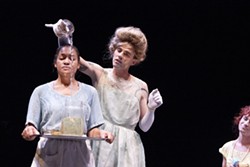Cuesta '13: Devising theater ain't easy, but Cuesta College sure makes it look good
By Ashley Schwellenbach[{
"name": "Newsletter Promo",
"id": "NewsletterPromo",
"class": "inlineCenter",
"insertPoint": "4",
"component": "15264767",
"requiredCountToDisplay": "0"
},{
"name": "Ad - Medium Rectangle CC01 - 300x250",
"id": "AdMediumRectangleCC01300x250",
"class": "inlineCenter",
"insertPoint": "8",
"component": "2963441",
"requiredCountToDisplay": "12"
},{
"name": "Ad - Medium Rectangle LC01 - 300x250",
"id": "AdMediumRectangleCC01300x250",
"class": "inlineCenter",
"insertPoint": "18",
"component": "2963441",
"requiredCountToDisplay": "22"
},{
"name": "Ad - Medium Rectangle LC09 - 300x250",
"id": "AdMediumRectangleLC09300x250",
"class": "inlineCenter",
"insertPoint": "28",
"component": "3252660",
"requiredCountToDisplay": "32"
}]
We’re still in the rehearsal phase” is a common enough phrase among theater directors. It’s an incantation of sorts, casting a protective ward between reviewers and the material they’ve been sent to judge.
Twelve days before the opening night of Pool ’63, Cuesta College Director of Theater Arts bree valle trots out the warning, but before there’s time to wonder—or worry—how much honesty can sneak between the cracks of her disclaimer, she chases it with an unexpected tidbit: Pool ’63 will remain in a state of flux until it closes.
Nothing is sacred. Except, valle says, the identical wood boxes, which are used rather ingeniously as accessories, furniture, and well, more furniture—but it’s a very different sort of furniture than before, I assure you. Which means that any scene might be cut, trimmed, or reworked before Pool ’63 even opens, from the rape scene in the opening act to the cross-dressing Southern belles, the appearance of whom—fluttering their fans and murmuring in a saccharine drawl—adds just the right amount of levity to prevent the audience from collectively putting their heads through the nearest wall due to the weight and tragedy of the racism at the play’s focal point. The ’63 in the title refers to 1963, and the pool in question is located in Birmingham, Alabama. And it’s whites-only.
Having grown up in Canada, valle wasn’t all that familiar with the significance of Birmingham to civil rights history. But the 2012 shooting of a 17-year-old black boy in Florida changed that.
“I was outraged that a child was murdered and the killer was set free,” she explained. “This idea set me into researching the history of racism in the USA. With the 50th anniversary of the Walk on Washington, the pieces begin to fit into place. Racism is a global problem, a U.S. endemic, and a San Luis Obispo reality. Students researched different elements of racism, and together we narrowed our time and place to Birmingham, 1963 as that was the most segregated and toxic location.”
If the subject matter wasn’t sufficiently complicated, valle stayed true to her reputation for embracing experimentation—a tendency that sets the bar very, very high for her students and demands much of them—by opting to put the play together using a process called devised theater. This means that valle and her students wrote the play by improvising collaboratively to determine what worked and what didn’t. Just before the metaphorical curtain went up on their rehearsal, valle commented, “It’s the hardest, most difficult show I’ve ever done here. With the most inexperienced cast.” She later explained that only one of the actors in her class had previously used the devised theater method.
“Creating theater from nothing is time-consuming and requires a group of people that have a shared vocabulary and style. We try a million things and out of the million keep only one of the ideas,” she explained.
But valle acknowledges that there are advantages as well. While the rest of the county’s community theaters tend to scramble whenever a script calls for racial diversity, valle’s students could craft the play’s black characters—of which there are four, which is, sadly, quite probably a county theater record—around the availability of students to play the parts. And when the rehearsal begins and Grace Jackson (Jayde Forzetting)—wide-eyed and reluctant, as though some part of her knows what’s to come—finds herself facing a busload of white businessmen grunting and clawing at her, it’s immediately apparent that the students mean to make maximum use of every character to explore the uncomfortable and undeniably charged theme. The spit that flies from the mouths of three white women and onto Grace, who was just raped, is a bit of overkill, but certainly punctuates the point.
But before we lose ourselves in the hardships of what was, Forzetting serves up an important reminder that each actor brings a unique set of experiences, and baggage, to the stage. When asked which scene is the most challenging—a seemingly easy question to answer for a college student whose character is gang-raped in the opening scene—Forzetting replied that the scene in which she argues with her husband, Donald (played by Meshack Burton), was the hardest for her because she wasn’t raised in a two-parent household. Neither of them were, in fact, and the difficulties of untangling and realistically portraying a family dynamic neither Burton nor Forzetting experienced outweighed the many other challenges of playing a character whose life and experiences are intended to encapsulate the difficulties of being black in the South before desegregation.
But the portrayal of the small family—Grace, Donald, and young, enthusiastic, and fearless Rosa (Rainey Forzetting)—was surprisingly tender, which is a difficult emotion to evoke when mother, father, and daughter all happen to be the same age, and merely classmates who met one another at the beginning of the semester. This is where Grace and Rosa have an edge. Jayde and Rainey, it turns out, are not merely sisters, but twins, and Rainey confessed that she relied on that bond to help summon the protective, maternal attitude her character is supposed to assume over the boisterous Rosa.
Of course, there are dangers to resting so much on the shoulders of just a few students who are, as valle pointed out, struggling with the significant challenge of not having a solid script on which to rely. But with an ensemble that shifts effectively from creepy, bestial businessmen to convincing schoolchildren to one of the most entertaining portrayals of Southern belles in recent memory, the equation somehow works. There’s a balance between the sort of generic Everyman storyline and the playful, experimental methods utilized to deliver that story. And Cuesta’s Theater Department gets to keep its reputation for pushing the artistic envelope far beyond what most other theater companies are willing to attempt.
Managing Editor Ashley Schwellenbach improvises all her dialogue. Contact her at [email protected].











